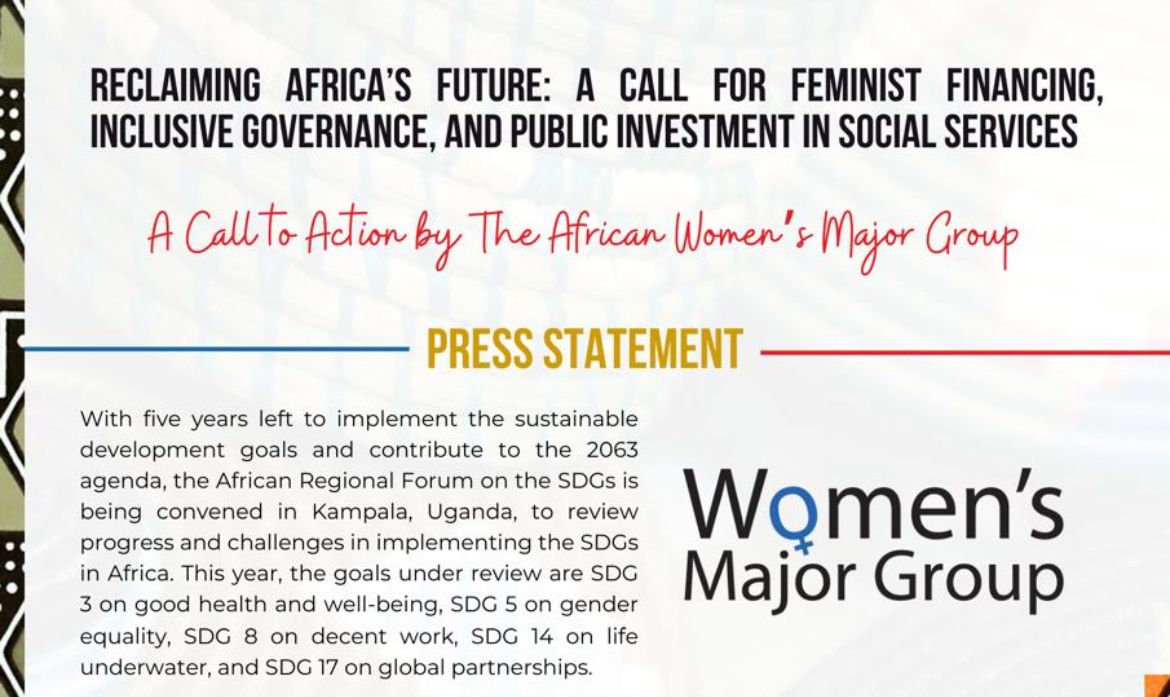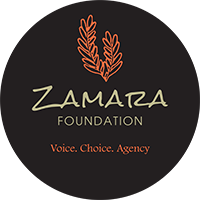
AWMG PRESS STATEMENT ARFSD
With five years left to implement the sustainable development goals and contribute to the 2063 agenda, the African Regional Forum on the SDGs is being convened in Kampala, Uganda, to review progress and challenges in implementing the SDGs in Africa. This year, the goals under review are SDG 3 on good health and well-being, SDG 5 on gender equality, SDG 8 on decent work, SDG 14 on life underwater, and SDG 17 on global partnerships.
As African citizens, feminists, and members of the African Women Major Group, theAfrican Women’s Major Group is a member of the Africa Regional Civil Society Engagement Mechanism (ARMMGOS). We have a mandate to represent the voices of women & girls in all their diversity in regional and global United Nations sustainable development processes.
During the 11th session of the African Regional Forum on SDGs, we recognize the achievements of African member states and call on them to adopt our recommendations to ensure Africa can accelerate the implementation of the SDGs for all women and girls. These recommendations were presented to the ARFSD during the Major Groups and Stakeholders Workshop for consideration and inclusion in the outcome statement of the Forum and the African Common Position for the World Social Summit.
To begin with, we acknowledge that significant progress has been made towards achieving the SDGs under review; however, the current global socio-political and economic landscape, in particular, natural disasters, climate crises, conflicts, debt crises and political uncertainties, have affected and delayed progress. An evident delay in progress, and even regression for some countries, is in the achievement of indicators on SDG 3.7- on sexual reproductive health and rights and SDG 5 on gender equality primarily due to pervasive socio-cultural norms, laws and policies that limit access to information and services like Comprehensive Sexuality Education and contraceptive services. Furthermore, African governments remain lax in addressing challenges caused by climate crises, further exacerbating this regression.
The continent continues to experience a narrowed and shrinking civic space and a growing pushback against the rights of women, girls and gender-expansive persons. We have witnessed an uproar and uprising of voices of young persons rising every day from various corners of the continent, demanding their rights to participate in shaping their worlds. Free, unencumbered civic engagement is crucial in raising awareness on key issues aligned with the SDGs and holding governments accountable to the targets set. The increasing threats to democracy, the rule of law and gender equality, especially from the well-organized and coordinated anti-rights movements, continue to be a threat to good and inclusive governance and, therefore, a threat to the progress achieved. It is important to note that the anti-rights movement continues to be a threat to the achievement of progress in SDGs, and even while they often claim to support African values, their actions are against our fundamental African spirit of ‘Ubuntu’ because they push for increased discrimination and entrenchment of patriarchal and colonial legacies.
Today, we re-echo the message propelled by African women and feminists in 1985 during the third meeting of the United Nations Decade for Women: the “World is in Crisis”! Today, as it was 40 years ago, the world is in crisis, leaving women and girls facing the biggest brunt of its problems. In the Nairobi manifesto, African women and feminists stated that “the major problems faced by Africa are external domination and the misplaced priorities of existing development strategies resulting in internal mismanagement.” 10 years later, in 1995, a bold and consistent push for gender equality led to the ground-breaking Beijing Platform of Action which we are commemorating 30 years later. In this tradition, we are here with reminders that “Today we a face global poly-crisis”, with women and girls still facing the largest brunt of this. As we gather for the 11th African Regional Forum on Sustainable Development with member states, civil society and other stakeholders, we call for a renewed commitment to intersectional solutions that transform the lives of African peoples, especially African women and girl,s in their diversities.
Currently, access to healthcare is still hindered in many African countries by legal barriers, especially laws that criminalize diverse population groups. These legal barriers prevent young people, people living with HIV, women, and sexual and gender minorities from accessing critical healthcare. And despite the progress made on maternal mortality, the rates across Sub-Saharan African countries are higher (at 454 deaths per 100,000 births) than the global averages and the targets set in the SDGs of less than 70 deaths per 100,000 births. Some of these deaths result fromunsafe abortions, especially among adolescent girls and young women. Furthermore, the continent continues to register high rates of teenage pregnancies with a 2022 World Health Organization-Health in SDGs report stating that Sub-Saharan Africa has the highest adolescent birth rates (10-14) at 102 births per 1,000 women aged 10–14. Across the continent, health systems face many challenges in delivering health for all, mainly due to financial, infrastructural and human resource constraints. For equitable access to the right to health, it is pertinent to address existing barriers, for example, through adequate sector contributions to health. Many African countries continue to deliver below the Abuja declaration target that mandates countries to allocate at least 15% of their national budgets to health. Even with the less-than-optimal money that is assigned to health- money that is intended for women, girls, and marginalized communities is misappropriated. Furthermore, women and girls, while making up the more significant percentage of poor people on the continent, have to pay high out-of-pocket costs to access life-saving services.
Despite women making up half of Africa’s population, they hold only 26% of political positions and only 13% of corporate leadership positions. While we lauded the existing legal and policy frameworks at the regional, national and local levels, many African countries have failed to domesticate regional instruments such as the Maputo protocol or implement laws and policies that address gender-based discrimination and violence. Women and girls are still being subject to gross human rights violations and economic disparities despite their political, social and economicparticipation. Currently, African women comprise 62% of the workforce compared to the global average of 47% and contribute 44% of household needs. Even with this contribution, 1 out of every 10 women globally lives in extreme poverty, the majority of whom live in Sub-Saharan Africa.
Additionally, girls and women are the most vulnerable when it comes to informal work because they find it harder to access education, training, and employment opportunities. Girls have high rates of unemployment and slow rates of transitioning from school to work, with the World Bank reporting that by 2021, over 30% of girls in Africa between 15 and 24 years of age were neither in school nor in employment. Their opportunities to work in the formal sector are affected mainly by a lack of skills, limited access to finance, lack of networks, discrimination, and restricted mobility, thus forcing them into informal work.
Worthy of note is that African women also play a critical and undervalued role in managing and conserving marine resources, encompassing activities from fishing and processing to conservation efforts and policy advocacy. They possess deep local knowledge of aquatic ecosystems and resources, which is crucial for developing sustainable conservation strategies. Many African women rely on fishing, making up 60% of those handling fish once landed, water collection, and conservation of aquatic resources for their livelihoods and food security. Despite this crucial contribution, women who rely on and contribute to marine resources are not only directly impacted by the effects of climate change, with marine resources forming part of the tradeable commodities, but are also rarely included in the design of climate adaptation strategies and do not make up the majority of the benefactors from them. They are disproportionately affected by environmental degradation and climate change, and their contributions to marine conservation are often overlooked, necessitating increased participation and funding.
Download full Press Statement HERE.
